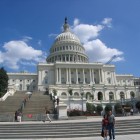
Young People Throng to Nation’s Capital to Catch a Glimpse of History
|
WASHINGTON, D.C. – More than a million people poured into downtown Washington, D.C., yesterday, a federal holiday dedicated to slain civil rights leader Martin Luther King Jr., for the festivities marking the start of President Barack Obama’s second term in office. The crowd included hundreds of thousands of young people from around the country, from elementary school students accompanying their parents to college-age youth hanging out with their friends. They spent hours traveling on buses and trains to the National Mall, more hours waiting in the January cold for the ceremonies to begin, and many more stuck in gridlock at security checkpoints and Metrorail stations afterward on their way home. Youth Today asked some of these young people, many of whom were too young to vote for Obama either time, why they were there. On the Orange Line Metrorail from Vienna, Va., to L’Enfant Plaza, D.C.
“I just wanted to see what Michelle was wearing,” joked Sarah Allu, 19, who boarded a Metrorail train in Vienna, Va., at the far end of the Orange Line, early Monday morning to head to the National Mall with Amandeep Sandhu, 20, and Pravarjay Reddy, 18.








